It’s 2025 here in SF, but 2011 in Pawnee. To set the scene: Justin Bieber’s Baby is taking the world by storm. “I think they did this song on Glee” is the cry heard ‘round the world. EVERYONE is downloading Angry Birds. Skinny jeans — in basically all colors except for denim — have us all in a chokehold. I, meanwhile, look like this:
And over in Pawnee, the government’s been shut down for the entire summer, after state budget auditors Ben Wyatt and Chris Traeger came on the scene. Unable to work, what has our Parks department been up to?
Ron’s living at his cabin in the middle of nowhere, chopping wood. Donna’s the top phone salesperson at a rubber nipples company. Tom’s working at Lady Foot Locker. April’s been in Venezuela, finding a new boyfriend to make Andy jealous. Jerry’s been painting his magnum opus near a lake. And Leslie’s been spending every second plotting for the Parks department’s return.
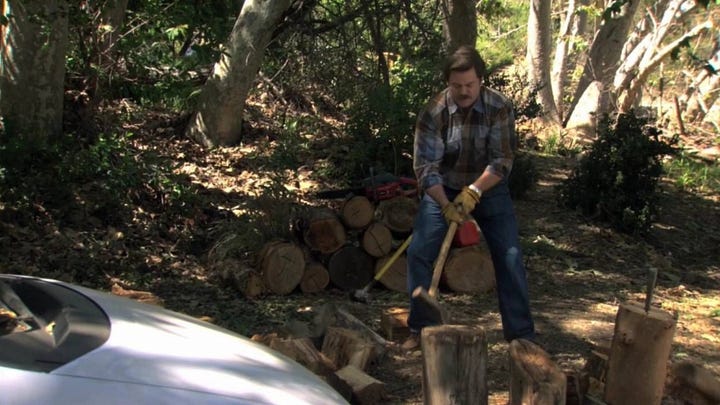
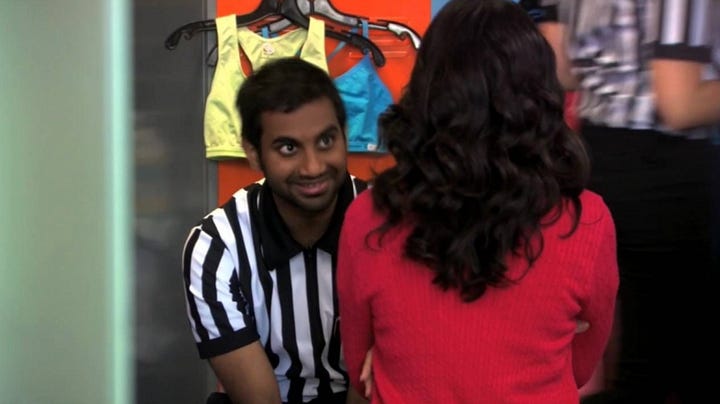


The government finally reopens as the summer comes to a close, but the Parks budget has been absolutely slashed. Leslie spends the episode trying to find any way possible to convince Chris and Ben to give her more money, and she’s not above using Ann as bait. She convinces Ann to go on a date with Chris — who’s been pursuing her since she drunkenly kissed him in “The Master Plan” — and casually slip the Parks predicament into conversation over pasta. Leslie and Ann role-play how this might go:
Ann: “And how, exactly, am I supposed to casually steer the conversation towards the Parks department budget?”
Leslie: “Okay, it’s totally easy. You be Chris. I’ll be you. I’ll show you how it’s done.”
Ann (as Chris): “Ann Perkins. You are wonderful, and amazing, and I’m happy to be here with you.”
Leslie (as Ann): “Thank you, Chris. I’m wearing a tuxedo vest with no shirt on underneath. Uh-oh.”
Ann (as Chris): “Can I get you a drink? I love every single beverage in the world.”
Leslie (as Ann): “I would like some wine. And oops, my vest popped open. Just like the budget needs to pop open, and you need to pour it into my … Parks department.”
The only thing that the government DOES have the budget for? A rec basketball league, with one team coached by Andy and the other coached by Ron. Andy runs whatever the opposite of a tight ship is — the loosest, silliest ship in existence. Ron, on the other hand, runs that team like it’s the goddamn military.
His stint as a coach is what ultimately leads us to one of P&R’s greatest inventions: the Swanson Pyramid of Greatness.
As part of their practice schedule, Ron introduces his team to the Swanson Pyramid of Greatness, which he calls his “perfectly calibrated recipe for maximum personal achievement.” I’ll let you inspect the Pyramid at your leisure, but some of my personal favorite squares include:
Crying: acceptable at funerals and the Grand Canyon.
Buffets: whenever available. Choose quantity over quality.
Torso: should be thick and impenetrable.
Cabins: a place to rest that is made of logs.
According to my trustworthy Parks & Rec sources (Reddit), the Swanson Pyramid of Greatness isn’t a brand-new concept spun up by the writers; it’s actually based on famous UCLA basketball coach John Wooden’s Pyramid of Success. Wooden invented the Pyramid back in the 1950s and used it to lead the UCLA men’s basketball team to 10 NCAA championships in 12 years during the 1960s and 70s. (Good for UCLA, but as always—Go Bears.)
Wooden’s Pyramid was built to help his team find and optimize behaviors in their personal and professional lives, emphasizing teamwork and work ethic to build character, which he believed would lead to what he called “competitive greatness.” To this day, the Pyramid remains a popular training method for companies, sports teams, and schools.
While P&R is the only show I can think of that fully adapts the Pyramid of Success into its own thing, it’s definitely not the only show to lean on Wooden’s Pyramid. Another mustachioed, Midwestern sports coach favors Wooden’s ideologies, so much so that he has the Pyramid framed on the wall of his office at AFC Richmond. That’s right: it’s my good pal Ted Lasso.
In going down this Reddit rabbit hole about the Swanson Pyramid of Greatness, I rewatched the Ted Lasso season 2 finale, which is literally called “Inverting the Pyramid of Success.” The Pyramid itself is never overtly mentioned, although Ted alludes to Coach Wooden in passing when talking to his players in a pre-match practice. Later, before heading out to the match that will determine whether AFC Richmond will be re-promoted to the Premier League, Ted’s assistant coach Nate (hate that guy) stands studying the Pyramid on Ted’s wall. It’s a specter looming throughout the episode, prodding us along without fully ever stepping out of the shadows.
The comparisons between Ron and Ted write themselves: they’re both attempts to portray non-problematic white male protagonists, which the shows accomplish by taking a traditional model of Midwestern macho masculinity and spinning it on its head. I like to think that their respective mustaches are intended to be symbols of this.
Ron is Ted’s predecessor in a lot of ways, but more reflective of the late aughts / early 2010s when it comes to expression of feelings and depictions of mental health. Ron’s softness comes in his willingness to champion Leslie and the fact that he falls apart in the hands of women like Tammy 1 or 2, but we only ever see him truly be vulnerable with his feelings in the show’s last season, after a fight with Leslie that drags on for a few years. We generally know him as a woodworking, outdoorsy, salt-of-the-earth macho man with an occasional giddy little laugh, not necessarily someone who’s open about his feelings. Ted, on the other hand, openly struggles with his mental health. Brought over to London from Kansas to coach a soccer team, he deals with panic attacks and (reluctantly, at first) sees a therapist in most episodes.
Similarly to Ron, Ted openly defers to the women he works with, forming genuine friendships with people like Rebecca (the legendary Hannah Waddingham) in the same way Ron does with Leslie, while making it evident that these women are the boss. Just because he’s surrounded primarily by men doesn’t mean he views women as any less. This is true for Ron too, which he openly says time and time again. I keep thinking back to the “Woman of the Year” episode, when Ron helps Leslie secure the IOW award and tells her that he “loves powerful women.” There’s also an amazing episode in season 4 (spoilers) called “Pawnee Rangers,” in which Ron and Leslie find themselves at odds over how to run their respective boys and girls wilderness groups. Ron wants to teach boys how to cook beans near a fire, build a shelter with just a tarp and a box, and sit in silence in nature. Leslie, on the other hand, runs her group of girl campers on female-empowerment-themed crafts, spirited debates, and positive affirmations. When all of Ron’s campers express the desire to join Leslie’s group, Ron isn’t upset about the boys and girls mingling. He’s actually totally fine for the boys in his group to join Leslie’s.
Wooden’s Pyramid is broadly applicable enough to be applied to the masses, from a men’s basketball team at UCLA to the fictional AFC Richmond soccer team in Ted Lasso. It’s supposed to help anyone find a version of personal and professional achievement. It dispenses arbitrary rules like “alertness: be observing constantly. be open-minded. be eager to learn and improve” that are vague enough to leave room for one’s own interpretation.
But the Swanson Pyramid of Greatness is the opposite: there’s no room for interpretation to one’s own life. There’s no vagueness to “Crying: Acceptable at funerals and the Grand Canyon.” And even though Ron “loves powerful women", there’s no denying that his Pyramid feels very boy. All Ron really wants is to teach his rec basketball team — and later, the Pawnee Rangers — a specific type of masculinity, which is an exact reflection of his own principles. He’s not putting anyone else down because of it, and he doesn’t treat women any differently just because they don’t necessarily adhere to his Swansonian ideas of greatness.
I’ve been thinking about this model of masculinity a lot and tracking it over the course of the show. For what it’s worth, I think Ron evolves significantly as the show goes on with regards to the type of masculinity he portrays, just as Ted goes from someone who lives in complete denial of his panic attacks to someone who openly owns mental health struggles to his team. Let’s not forget the “Hunting Trip” episode back in season 2, when Ron does, in fact, try to keep it a men-only excursion. I think it’s totally fair to assume that, in 2011, the Swanson Pyramid of Greatness was intended mainly for boys, and that Ron changes by the season 4 “Pawnee Rangers” episode as far as how he thinks about boys’ behavior. We’ll keep thinking about it!
But quite frankly, I find the Swanson Pyramid of Greatness hilarious. Nick Offerman and the P&R creators built Ron into such an absurdly unique, principled character that it’s legitimately insane to imagine more than one Ron running around. Imagine every boy on his basketball team following the Swanson Pyramid of Greatness to a T. Imagine an army of mini-Ron Swansons, running amok around Pawnee. It is an absolutely insane image.
I know I said I’d be posting Thursdays at 5:30 PT / 8:30 ET from now on, and then immediately ignored that. I had some big aspirations to get ahead on writing between Christmas and New Year’s, and then I:
But I’m slowly recovering from having absolute tumbleweeds for brains the past few weeks, so from HERE on out, see you Thursdays :)


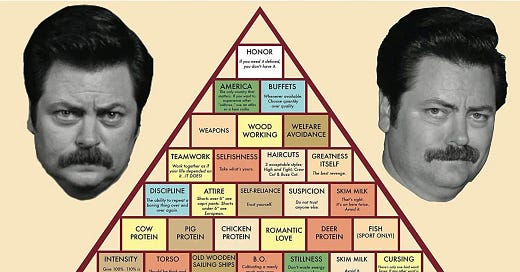


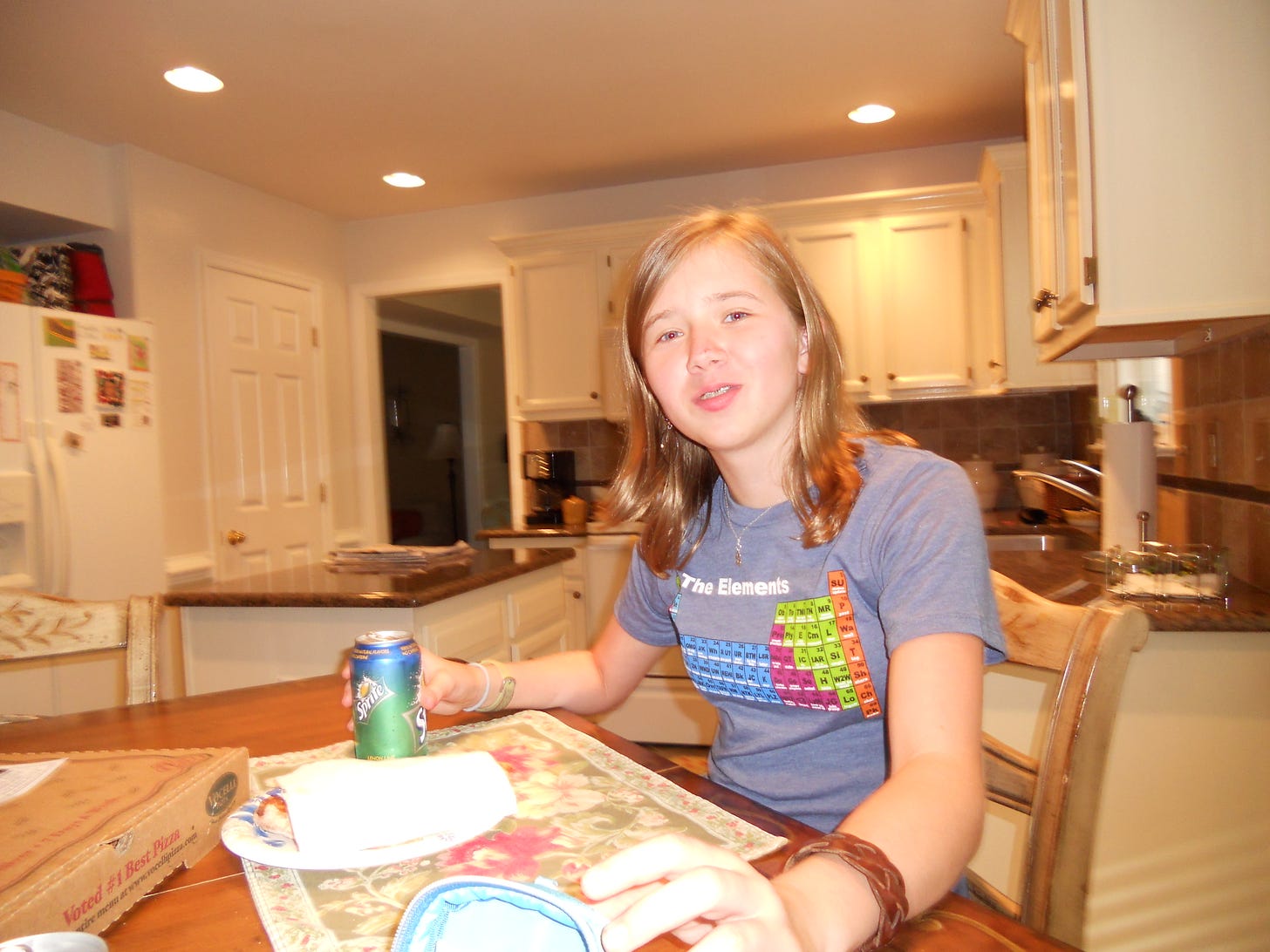


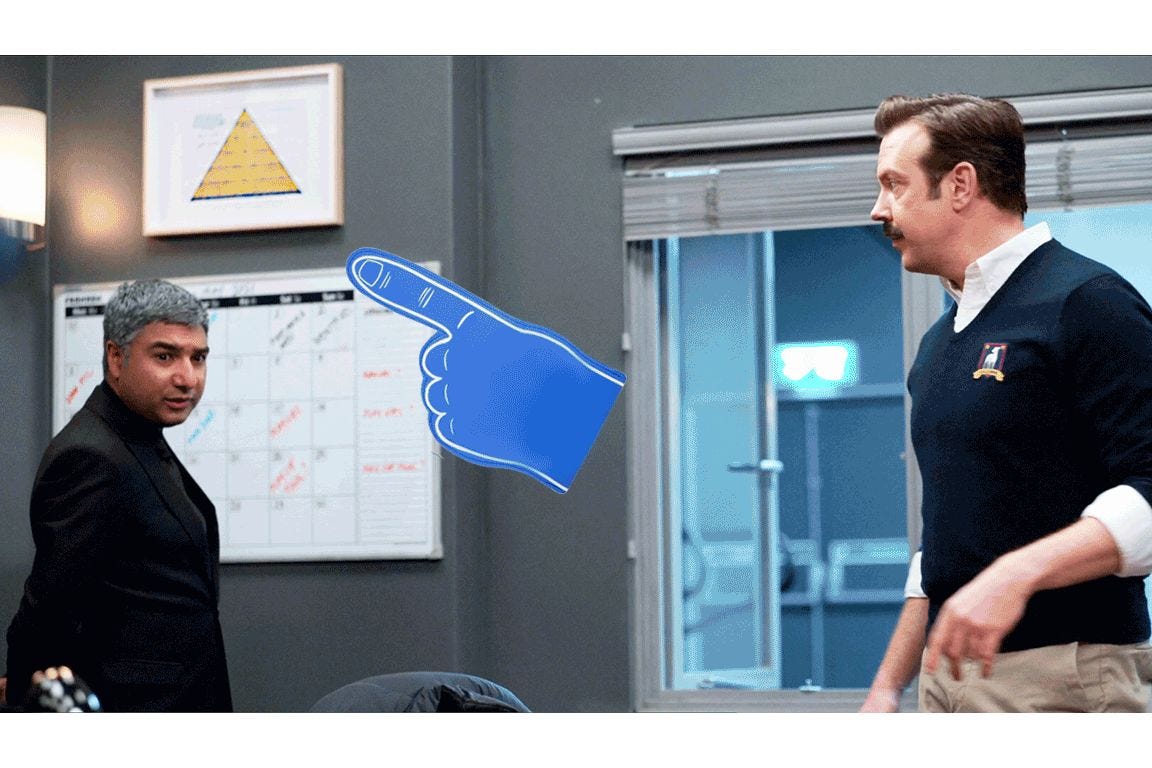
Omg Ted really gives Ron when he doesn’t like tea 😂